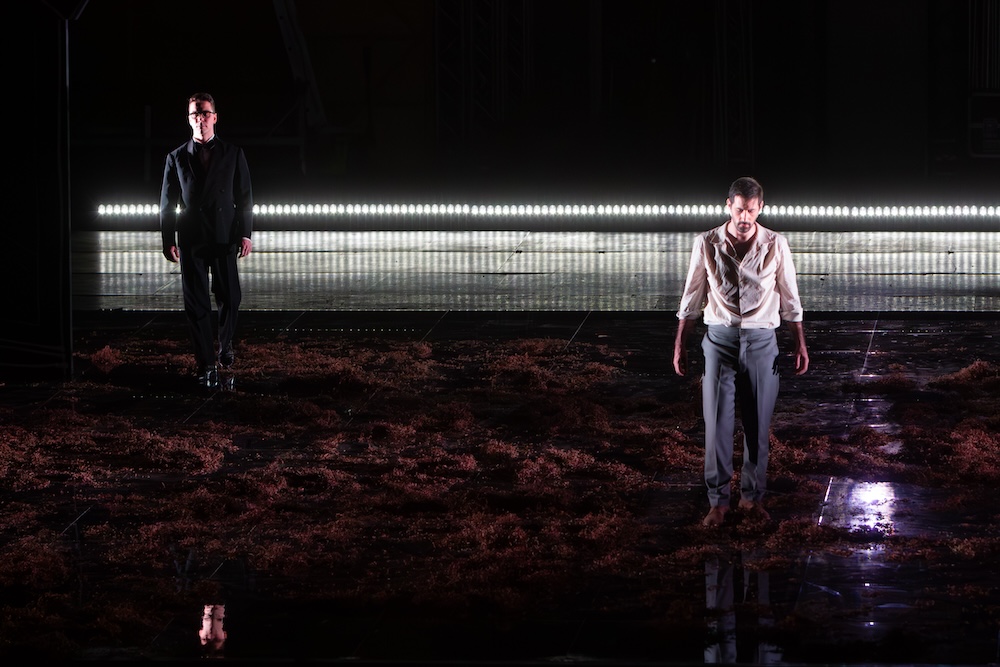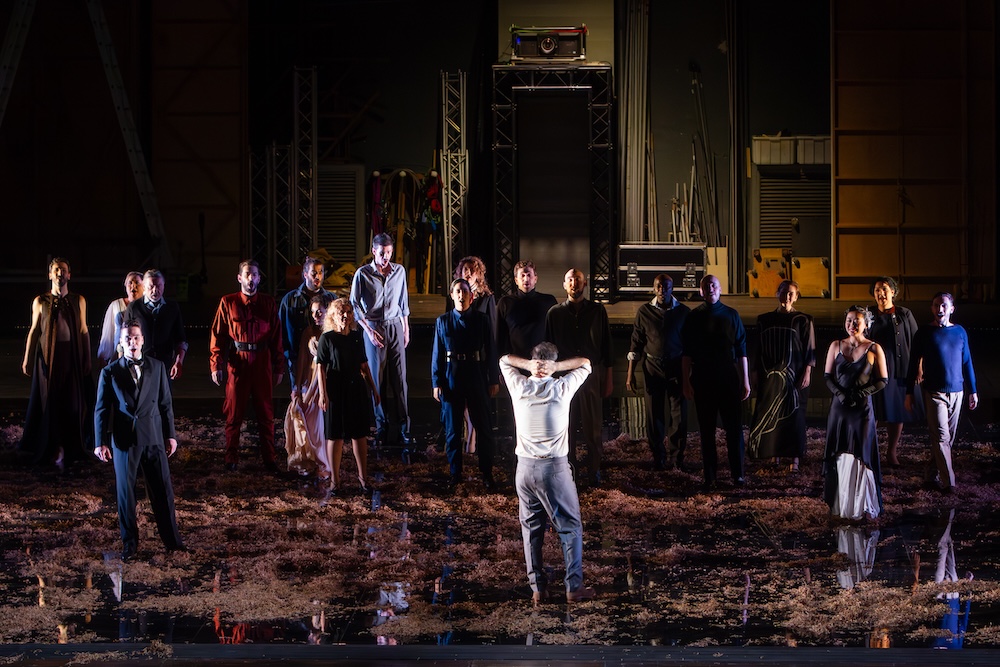The stage director informed us that this Orfeo was effected through the lens of quantum physics and the Schrödinger paradox. Be that as it may, it was a splendid L’Orfeo boasting a powerful Orpheus and a hyper dynamic orchestra — Zurich’s Il Pomo d’Oro.
Italian baritone Marco Saccardin embodied both the Orpheus of the Renaissance and a current, millennial generation Orpheus. Mr. Saccharin is actually steeped in the arcane world of Early Music. He is a concert lutenist and, in baritone voice he sang Plutone in the Salzburg Festival’s 2023 L’Orfeo. Just now, at Cremona’s Monteverdi Festival he sang a splendid Orfeo, with an impressive reserve of power and volume, executing the role’s magical ornamentation with energetic finesse, finding the dissonances in Monteverdi’s words and lines with infectious, expressive relish.
The 24 players of Il Pomo d’Oro made a mighty sound in Cremona’s Teatro Ponchielli, embellishing Monteverdi’s famed recitative with rhythms and colors that added even greater magic to Mr. Saccarin’s performance. A published edition of the opera was not indicated in the program, thus the assumption is that Francesco Corti, Il Pomo d’Oro’s “maestro al cembalo,” was the musical mastermind of the evening. Of particular note were the five trombones that created Monteverdi’s magnificent inferno, and the two trumpets that wrought heraldic magnificence when needed. The continuo included a lirone (a bowed lyre), adding period color to the continuo, the theorbo adding striking punctuation at crucial moments.
Mr. Saccardin was an elegant Orfeo. He was the Renaissance artist who accepted the challenge to balance, somehow, emotion and art, recognizing its impossibility, but exploring its possibilities. This Orfeo was also a young man full of life, a young man who had to face life’s challenges, a young man who suffered a crisis of confidence in both himself and in the gods (the world’s institutions).
We — everyone in the theater — were entranced by life and art.

Eurydice forever lost, Apollo descended from the heavens to comfort Orfeo, inviting him to Platonically contemplate Eurydice who resides finally among the stars. This was Monteverdi’s librettist Alessandro Striggio’s expeditious resolution of the conflict of art and life. Apollo, sung by fine baritone Giacomo Nanni, and Mr. Saccandin’s Orfeo reveled in a final, highly ornamented duet that achieved a maximal quantum of male energy and artistic enthusiasm.
During the final, celebratory madrigal Orfeo, however, fell prostrate, hanging over the edge of the stage. He was handed a lute from the pit, on which he joined the orchestra for its final flourishes. He was Orfeo the artist, and Orpheus the young man. The climax of the performance was, however, yet to come — the final orchestral chord cut off, Orfeo then plucked two more, lone notes on his lute.
We knew then, as Orpheus had learned, that life and art will never reconcile.
French stage director Olivier Fredj had many more fine staging ideas. At the beginning Orfeo and Eurydice, sung by Jin Jiayu, appeared before the curtain in formal dress, where Eurydice became the personification of music, extolling its powers, and the musical prowess of Orfeo. Orfeo and Eurydice again appeared, parading down the mail aisle of the auditorium at the end of the intermission, glass in hand, and toasted the maestro as he entered the pit. Mr. Fredj made sure that we knew we too were a part of the Orpheus dilemma.
There were many more excellent performances. Contralto Margherita Sala sang the Messaggera who in the urgent tones of Monteverdi’s passionate speech recitative recounts the death of Eurydice. Caronte was enacted by bass Alessandro Ravasio with subtlety and a plentitude of beautiful bass tone. Both young artists have made Early Music their performance field.

There were 13 additional singers who embodied Monteverdi’s many smaller roles, including Paola Valentina Molinari who sang Proserpina to Rocco Lia’s Plutone. The Inferno’s Speranza was sung by Laura Orueta, these artists were winners and finalists in the 2023 Cavalli Monteverdi Competition as were many others in the cast.
The Shepherds (Pastori), Spirits and Nymphs were joined by the Coro Cremona Antiqua to deliver, majestically, the madrigals that realize the monumental plasticity of Renaissance art in the opera’s many moments of emotional closure.
The production itself became a bit troubled with too many projections that were difficult to interpret and too many changes of background that were superfluous at best. The costuming as well was for more complex than necessary to realize stage director Olivier Fredj’s concept.
These reservations aside, it was Monteverdi’s triumph, and that of Mr. Saccardin as well.
Michael Milenski
Teatro Ponchielli, Cremona, Italy, June 21, 2024. All photos copyright PhStudio B12, courtesy of the Teatro Ponchielli – Monteverdi Festival.